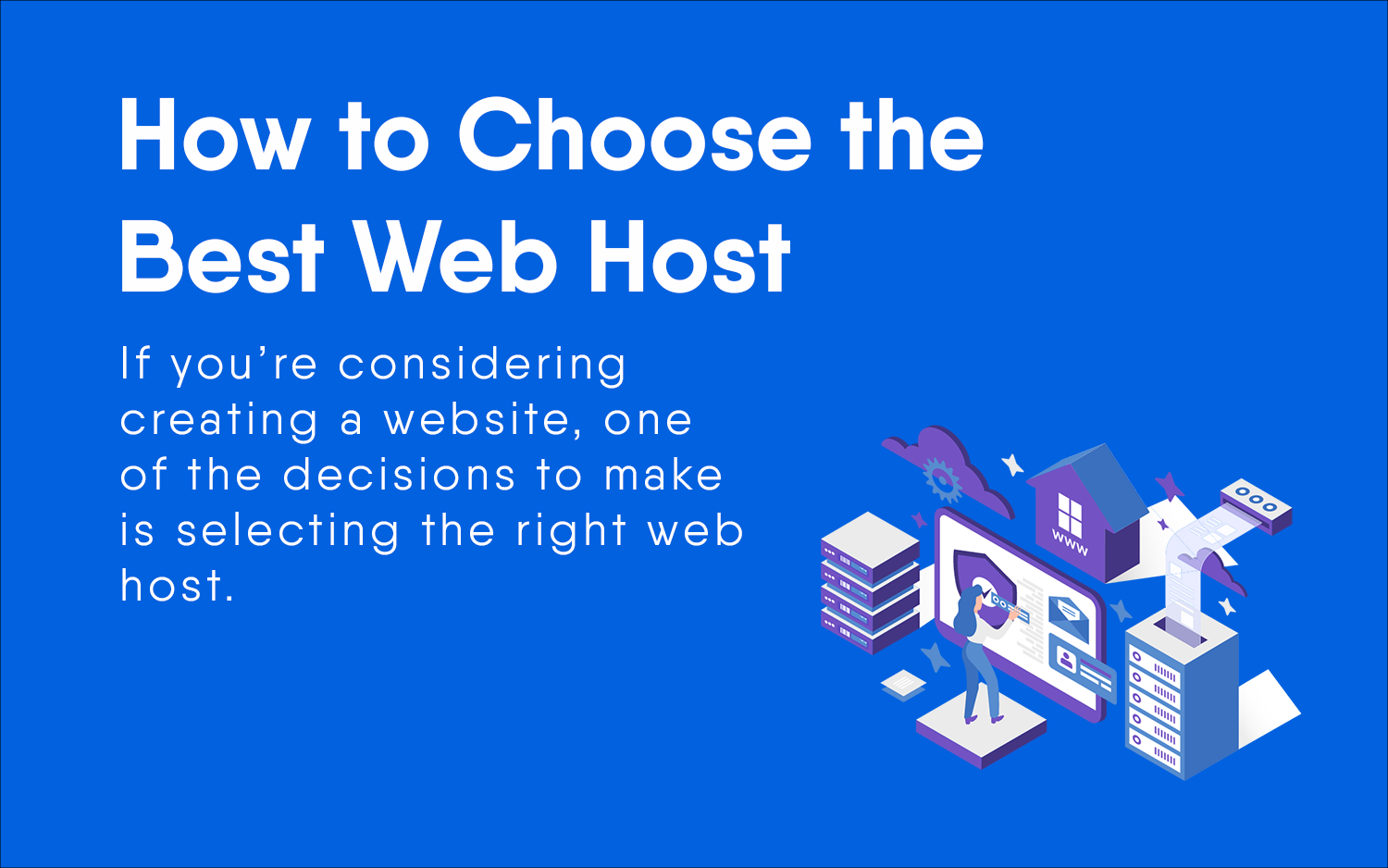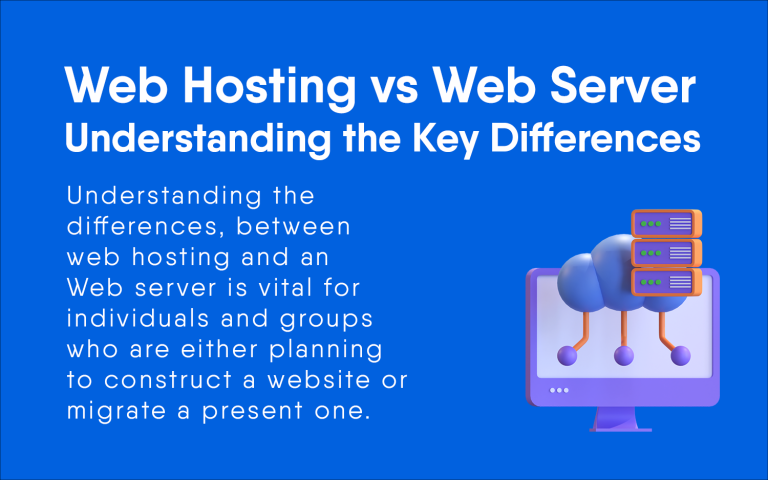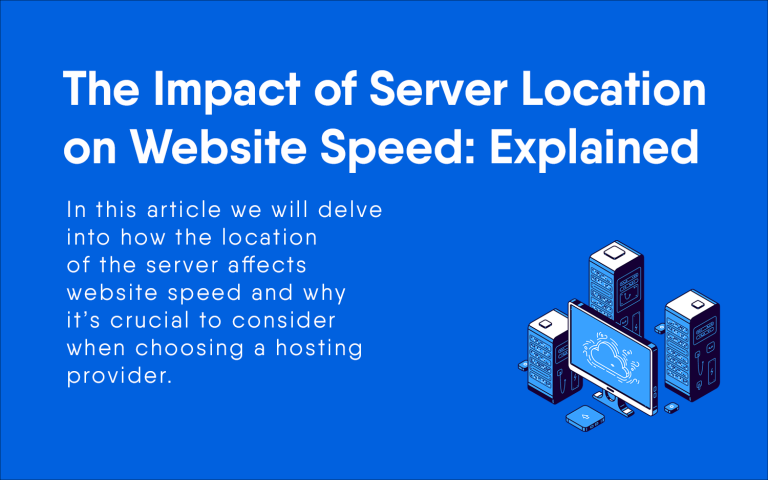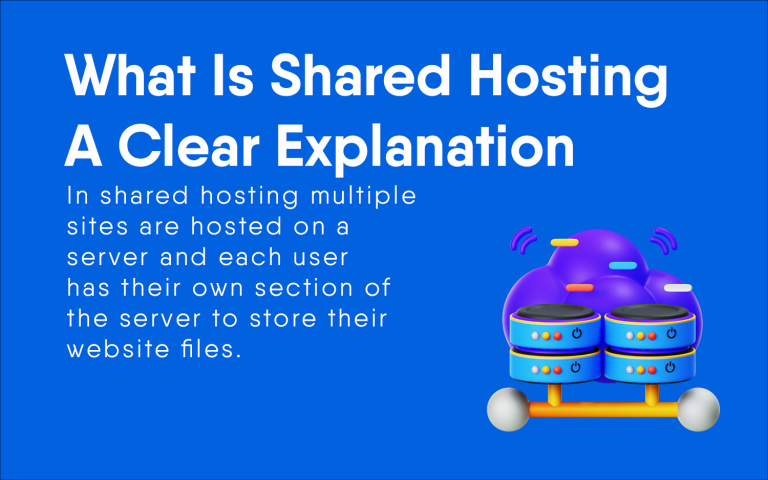How to Choose the Best Web Host: The Ultimate Guide to Factors You Should Consider
If you’re considering creating a website, one of the decisions to make is selecting the right web host. A web host is a company that provides the technology and services for your website to be available on the internet. With numerous options available it can feel overwhelming to choose one. In this article we’ll share some tips on how to pick the web host for your requirements.
Understanding web hosting is the step towards making a choice about your web host. Web hosting is a service that permits individuals and organizations to have their websites accessible on the Internet. A web host offers both the infrastructure and services required to store and publish your websites content online. When you opt for a web host, you are renting space on their server to store all your websites files.
There are types of web hosting options such, as shared hosting, virtual private server (VPS) hosting dedicated hosting and cloud hosting. Each type has its set of advantages and disadvantages so choosing which one suits your websites needs will depend on factors. In the following section we will delve into each type of hosting with detail.
Key Points to Remember
- It is crucial to have an understanding of web hosting in order to select the web host for your website.
- There are types of web hosting each with its own advantages and disadvantages.
- The choice of hosting will largely depend on the needs of your website.
Understanding Web Hosting
When it comes to building a website, one of the decisions you’ll make is choosing a web hosting service. Essentially web hosting is the service that makes your website accessible, on the internet. Without it your website wouldn’t be available for anyone online.
Web hosting services are provided by companies known as web hosts or web hosting providers. These companies offer types of hosting services like shared hosting, dedicated hosting, VPS hosting and more. Each type has its pros and cons so it’s essential to grasp their differences before settling on a provider.
All in all picking the right web host is a decision that can greatly impact the success of your website. By having an understanding of the types of hosting and considering the factors mentioned above you’ll be able to choose a suitable provider that caters, to your requirements and helps your website thrive.
Different Types of Web Hosting
When selecting a web hosting service one crucial factor to consider is the type of hosting that will suit your website best. In this section lets delve into the options of shared hosting, VPS hosting, dedicated hosting, cloud hosting and managed WordPress hosting.
Shared Hosting
Shared hosting is an cost effective choice, for web hosting. It involves your website being hosted on a server that is shared with websites. This means sharing server resources such as CPU, RAM and disk space with sites on the server.
Shared hosting works well for websites that don’t require resources. It’s also ideal for beginners who are starting their website. However it may have limitations in terms of performance and scalability if your site begins to grow and attract traffic.
VPS Hosting
VPS (Virtual Private Server) hosting refers to having your website hosted on a server that is divided into virtual machines. Each virtual machine has its resources, like CPU, RAM and disk space.
VPS hosting is a choice, for websites that require resources beyond what shared hosting can offer. It’s also ideal for websites that value control and flexibility over their hosting environment. When you opt for VPS hosting you gain access to your virtual server allowing you to install and configure any software as needed.
Dedicated Hosting
Dedicated hosting on the hand refers to a type of web hosting where your website resides on a server exclusive to your use. This means you have authority over server resources like CPU, RAM and disk space.
Dedicated hosting proves advantageous for websites with high resource demands seeking performance and reliability. It also suits those who prioritize top notch security and privacy. However it’s worth noting that dedicated hosting tends to be the option in web hosting and necessitates technical proficiency, for effective management and maintenance of the server.
Cloud Hosting
Cloud hosting represents another form of web hosting wherein your website leverages a network of interconnected servers working collaboratively to deliver availability and scalability. Unlike single server setups hosted websites benefit from increased redundancy across multiple servers.
Cloud hosting is an option, for websites that need to be highly available and scalable. It’s also ideal for handling increases in traffic. With cloud hosting you only pay for the resources you actually use making it a cost effective choice for websites, with traffic patterns.
Managed WordPress Hosting
Managed WordPress hosting is a type of web hosting designed exclusively for WordPress websites. When you opt for managed WordPress hosting your website is hosted on a server optimized specifically for WordPress and the hosting provider handles all the aspects of managing your WordPress site.
Managed WordPress hosting is a choice if you have a WordPress website that requires top notch performance and security. It’s particularly suitable if you don’t have the knowledge to manage your server. However it’s worth noting that managed WordPress hosting can be pricier compared to types of web hosting and might not be the fit if you’re using different content management systems.
In summary choosing the right web hosting type is a decision that significantly impacts the performance and reliability of your website. Take into account your websites requirements, budget constraints and technical expertise when selecting a hosting service or provider.
When deciding on hosting for your website whether its shared hosting, VPS hosting, dedicated hosting, cloud hosting or managed WordPress hosting it is crucial to select a provider that can offer the features and support necessary for the success of your website.
Evaluating Your Requirements
One of the steps, in choosing a web host is assessing your specific needs. In this section we will discuss the factors to consider when evaluating your websites requirements. By taking the time to assess these needs thoroughly you will be better equipped to find a web host that matches your criteria.
Website Type
The thing to consider when evaluating your needs is determining the type of website you plan to create. Will it be a website? A business website?. Perhaps an eCommerce site? Each type of website comes with its set of requirements. Therefore it is essential to choose a web host that can accommodate those needs.
For instance if you are creating a website you may not require much storage or bandwidth as a business oriented site would. On the hand if you are building an eCommerce site you will need a web host that offers security features and supports popular eCommerce platforms such, as WooCommerce or Magento.
Budget Considerations
Another aspect to evaluate when assessing your needs is constraints. Choosing the right web hosting plan is crucial as it can vary in price and suitability for your budget. When considering your web hosting needs take into account factors such, as cost, storage capacity, bandwidth and overall performance. Additionally it might be worth exploring web hosts that provide promotions or discounts for customers.
Now that you have an understanding of your requirements and financial constraints it’s time to start researching web hosts. It is essential to select a reputable provider from the options available. To aid in your decision making process read reviews from customers. Explore the websites of potential web hosts to gather information about their services and features. Some popular choices in the industry include Hostinger, InMotion, Bluehost, HostGator, SiteGround and A2 Hosting.
Traffic and Visitors
Considering the expected traffic and number of visitors to your website is another aspect when determining your needs. If you anticipate levels of traffic on your site it becomes imperative to choose a web host of handling such loads efficiently. While evaluating options to you look for plans that offer scalability along with performance enhancing features, like flexible RAM allocation and various operating system choices. Additionally incorporating a content delivery network (CDN) can significantly improve the speed and performance of your website.
Technical Requirements
Before finalizing your decision make sure to take into account the requirements of your website. Depending on the platform and software you’re using there might be features that you need such, as PHP support, MySQL databases or SSL certificates.
When comparing web hosts it’s important to look for plans that offer the technical features you require. Additionally consider opting for a web host that provides a user control panel like cPanel or Plesk. This will make managing your website much easier.
To sum it up properly assessing your needs plays a role in selecting the web host. By considering aspects like your websites type, constraints, expected traffic volume and necessary technical features you’ll be well equipped to find a web host that caters to your requirements. Remember to conduct research on providers and choose one with a solid reputation, for reliability and support in order to ensure the growth and success of your website.
Key Features to Take into Account
When selecting a web hosting service there are factors that you should keep in mind to ensure you’re getting the best value, for your investment. In this section we’ll explore some of the features to consider when choosing a web hosting provider.
Reliability of Servers and Uptime Rating
One of the utmost important aspects to consider when opting for a web hosting provider is the reliability of their servers and their uptime rating. This is because you want to guarantee that your website is consistently accessible and available for your visitors at all times. Look for a web hosting provider that offers a rating of no than 99.9%. You can also refer to reviews and ratings from users to gather insights, on the providers dependability.
Storage Allocation & Bandwidth
Storage allocation and bandwidth are factors that should be taken into account while selecting a web hosting provider. Storage refers to the amount of server space allocated for storing your website files while bandwidth pertains to the amount of data that can be transferred between your website and its visitors. Ensure that the chosen web hosting provider offers storage allocation and bandwidth capacity suitable for your websites needs.
Considering Monthly Website Traffic
One crucial aspect to take into account is the estimated traffic volume your website will receive. This plays a role, in determining the bandwidth to handle your websites visitors. It’s important to ensure that your chosen web hosting provider offers bandwidth to accommodate this traffic.
Emphasizing Loading Speed and Performance
The loading speed and overall performance of your website play a role in enhancing user experience and positively impacting search engine rankings. It is advisable to seek a web hosting provider that guarantees loading speeds and good performance metrics. Additionally you can refer to reviews and ratings from users regarding the providers loading speed and overall performance.
Ensuring Data Security and Privacy
Data security and privacy are factors when selecting a web hosting provider. Look for one that offers SSL certificates, DDoS protection as other security features to safeguard your website and data from potential threats. It is also essential to review the providers privacy policy ensuring they are dedicated to protecting your information.
Prioritizing Customer Support (Live Chat or Telephone)
When making a decision about a web hosting provider it is crucial to consider their customer support options. Look for providers that offer 24/7 customer support through chat or telephone assistance, for assistance whenever needed.
To ensure you have access, to assistance whenever needed and prompt resolution of any issues it’s important to choose a web hosting provider that offers support.
Multiple Payment Methods
Consider opting for a web hosting provider that provides payment methods, such as credit card, PayPal and other online options. This will grant you convenience in paying for your web hosting services while allowing flexibility in choosing the payment method that suits you best.
Content Management System
If you plan to use a content management system (CMS) like WordPress verify that the web hosting provider offers support for your chosen CMS. This is crucial in ensuring the operation of your website and effortless content management.
Do They Offer a Free Trial/Refund Policy
Prioritize selecting a web hosting provider that offers either a trial or a refund policy. This allows you to test their services before committing to a long term contract and provides peace of mind knowing that you can request reimbursement if unsatisfied with the service.
Research About the Renewal Amount
Before finalizing your decision on a web hosting provider thoroughly research their renewal amount to avoid any surprises, down the line.
Some companies may offer rates but its essential to be cautious as they might increase the prices significantly when its time to renew. Therefore it’s crucial to understand the renewal rates before committing to a long term contract.
Server Responsiveness and Speed
Moreover ensure that the web hosting provider you choose delivers server responsiveness and speed. This ensures that your website loads quickly and provides visitors with an user experience. You can assess the providers server response time. Speed metrics to compare them with providers in order to make an informed decision.
To summarize when selecting a web hosting provider there are factors to consider. These include reliability of the servers and uptime score available storage and bandwidth monthly traffic volume capacity, loading speed and overall performance of the website data security measures and privacy protocols quality of customer support services provided by the company multiple payment options available, for convenience compatibility with content management systems (CMS) availability of trials or refund policies in case you’re not satisfied with their services renewal costs after any introductory offers expire, as well as server responsiveness and speed. By considering these factors in your decision making process you can be confident, in choosing a web hosting provider that aligns with your specific needs while offering excellent value for your investment.
Make Sure to Check the Essential Features
When you’re selecting a web hosting provider it’s crucial to ensure that they offer the features to support your websites requirements. Here are some of the features you should look out for;
Control Panel
A control panel’s a user friendly web based interface that allows you to efficiently manage your website and hosting account. Among the control panels is cPanel, known for its ease of use and wide range of features, like file management, email management and website statistics. Other control panels you might encounter include Plesk, DirectAdmin and Webmin.
Backup and Restore
Automatic backups play a role in any web hosting service. They provide peace of mind by ensuring that your website and data are secure in case of events. Look for a hosting provider that offers backups and user friendly restore options.
One-Click Installer
Having a one click installer like Softaculous or Fantastico can significantly simplify your life. With one click you can effortlessly install applications such, as WordPress, Joomla or Drupal. This feature saves time. Makes it hassle free to get started with building your website.
.htaccess File Access
The .htaccess file acts as a configuration file allowing you to customize how your website behaves. It’s crucial to have access to this file so that you can make adjustments to the settings of your website.
FTP/SFTP Access
FTP (File Transfer Protocol) and SFTP (Secure File Transfer Protocol) are used methods for transferring files between your computer and the web server. Having access to FTP or SFTP enables you to easily upload and download files to and from your website.
Access of Databases
Databases play a role in storing and managing types of data on a website, such as blog posts and user information. Ensure that your hosting provider offers access to databases and supports the database management system you prefer using.
Flexibility for Future Upgrades or Downgrades
Scalability is a factor when selecting a web hosting provider. While starting with a shared hosting plan is common it’s important to have the option to upgrade or downgrade as your website grows. Make sure that your hosting provider offers upgrade and downgrade options.
Server Locations and Data Centers
The geographical location of the server can impact the speed and performance of your website. Look for a hosting provider whose servers are located in the same region as your target audience. Additionally ensure that the hosting provider maintains data centers equipped with power sources and cooling systems.
For a comprehensive understanding of how server location affects website speed and performance, we invite you to explore our in-depth article: The Impact of Server Location on Website Speed: Explained.
Email and SMTP
Having an email service that is seamlessly integrated with your website is crucial for any business. It is important to choose a web hosting provider that offers email hosting and supports the use of SMTP (Simple Mail Transfer Protocol) for both sending and receiving emails.
To summarize the success of your website heavily relies on selecting the right web hosting provider. Make sure that the chosen provider offers all the features such as a user control panel, backup and restore options a convenient one click installer, access to .htaccess files, FTP/SFTP access, database accessibility, scalability options, multiple server locations and data centers as well as reliable email hosting services.
Website Building Tools
When it comes to building a website the choice of a website builder plays a role. Website builders are tools that enable you to create and personalize your website without any coding knowledge. In this section we will discuss factors to consider when selecting a website builder.
Explore Available Website Builders
Before settling on a web host it is essential to explore the options of website builders available. Some web hosts have their website builder platforms while others provide access, to third party builders. It is important to choose a web host that offers a website builder that aligns with your requirements.
Customization and Flexibility
Consider the level of customization and flexibility you desire when choosing a website builder. Certain builders provide customization options allowing you to create a unique brand centric website. However others may have limitations in terms of customization possibilities. Evaluate your needs. Select a website builder that offers the desired level of customization and flexibility.
Monitoring and Management
Monitoring and management are also aspects to consider when choosing a website builder. A great website builder should provide tools that enable you to keep track of the performance of your website and easily manage your content. Look for a website builder that offers features, like analytics, SEO tools and content management systems.
User Friendliness
User FriendlinessLastly when deciding on a website builder it’s essential to consider its user friendliness. A good website builder should be straightforward to use even if you lack expertise. Seek out a website builder with an interface and clear instructions. Some options may also offer tutorials or support to assist you in getting started.
In conclusion selecting the appropriate website builder is an aspect of creating a website. Take into account elements such as options, for building websites, customization and flexibility monitoring and management capabilities well as user friendliness when choosing a web host. By utilizing the right website builder you can develop a site that fulfills your requirements and helps you accomplish your objectives.
Conclusion
To ensure the success of your website it is vital to choose the web host. Throughout this article we have discussed factors that should be considered when selecting a web host.
Firstly comprehending your websites needs is of importance.
When it comes to creating a website there are factors you should consider. Firstly you need to determine the kind of website you want the amount of traffic you expect and the specific features you require. Once you have an idea of your website needs it’s time to research and compare hosting providers to find one that meets your requirements.
When choosing a hosting provider it’s crucial to check their technology and features. This involves looking into the type of server they use the amount of storage and bandwidth they offer, and the security measures in place. It’s also important to find a provider that offers support to assist with any issues you may come across.
Another important aspect is understanding what type of web hosting suits your needs. You can choose between hosting, VPS hosting or dedicated hosting. Each option has its advantages and disadvantages so selecting one that aligns with your website requirements is key.
Performance and speed are considerations when selecting a web host. Factors like server page load times and optimization features play a role in determining how well your website performs. Additionally prioritizing security measures provided by the web host will safeguard your site, against hacking attempts and other potential security threats.
Furthermore when selecting a web hosting provider it’s crucial to opt for one that’s user friendly and straightforward to set up and navigate. This entails having a control panel that’s intuitive, for users offering one click installations and providing website builders.
Overall making the right choice for a web host involves deliberation of factors. By conducting research and comparing hosting providers you can discover the one that aligns with your website requirements while delivering the necessary support and features essential for ensuring your websites triumph.

Faisal Rafique
I’m an accomplished entrepreneur and content creator with a strong background in technology and software engineering. My expertise spans web development, eCommerce, programming, hosting management, technical support, and data science. I hold a Master’s Degree in Computer Science and Engineering, and I have over 5 years of professional experience, which I leverage to grow my digital business and popular blog, FaisalRafique.com




